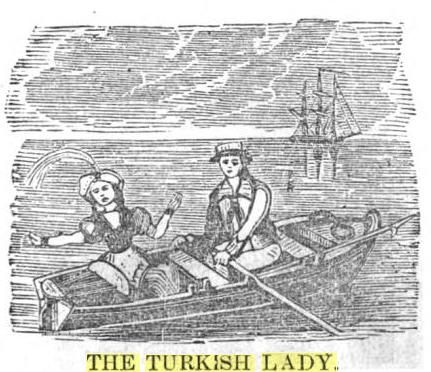The Turkish Lady- Forget-me-Not Songster c. 1845
[Barry lists this under Young Beichan and later in 1917 Kittredge points out;
"The Turkish Lady" sometimes appears as the title or sub-title of "Young Beichan." There is, however, another ballad (or song) called "The Turkish Lady,"- in a cheap literary style, - which has often been printed, and has obtained some oral currency. It tells substantially the same tale, but briefly, and names no names. (JOAFL)
R. Matteson 2012]

Illustration from The Forget-me-not Songster
From: A Garland of Ballads
by Phillips Barry
The Journal of American Folklore, Vol. 23, No. 90 (Oct. - Dec., 1910), pp. 446-454
II. YOUNG BEICHAN
(Theme: Captive-lover.)
"Stories and ballads of the general cast of 'Young Beichan' are extremely frequent." [9] Even the familiar tradition of Pocahontas and Capt. John Smith is not very far removed from this theme. A later British ballad, in this instance, probably an actual rewriting of some version of "Young Beichan" by a metre-ballad-monger, is still current.
THE TURKISH LADY[10]

1. Young virgins all I pray draw near,[11]
A pretty story you shall hear,
'T is of a Turkish Lady brave,
Who fell in love with an English slave.
2. A merchant's ship at Bristol lay,
As they were sailing o'er the sea,
By a Turkish rover took were we,
And all of us made slaves to be.
3. They bound us down in irons strong,
They whipped and lashed us along,
No tongue can tell, I'm certain sure,
What we poor souls did endure.
4. Come sit you down and listen awhile,
And hear how Fortune did on me smile,
It was my fortune for to be,
A slave unto a rich lady.
5. She dressed herself in rich array,
And went to view her slaves one day,
Hearing the moan this young man made,
She went to him, and thus she said, -
6. "What countryman, young man, are you? " -
"I am an Englishman, that's true." -
"I wish you was a Turk," said she,
"I'd ease you of your misery.
7. " I'll ease you of your slavish work,
If you'll consent to turn a Turk,
I'll own myself to be your wife,
For I do love you as my life."
8. "No, no, no," then said he,
"Your constant slave, madam, I'll be,
I'd sooner be burnt then at the stake,
Before that I'll my God forsake."
9. This lady to her chamber went,
And spent that night in discontent,
Little Cupid with his piercing dart,
Had deeply wounded her to the heart.
10. She was resolved the next day,
To ease him of his slavery,
And own herself to be his wife,
For she did love him as her life.
11. She dressed herself in rich array,
And with the young man sail'd away,
Unto her parents she bid adieu,
Now you see what love can do.
12. She is turn'd a Christian brave,
And is wed to her own slave,
That was in chains and bondage too,
By this you see what love can do.[12]
Footnotes:
9. F. J. Childs, V. "Young Beichan."
10. "The Turkish Lady," A, Folk-Songs of the North Atlantic States. Melody from MS. of O. F. A. C., Harrisburg, Pa.
11. From The Forget-me-not Songster, Nafis and Cornish, New York (c. 1845), p. 169.
12 From The Forget-me-not Songster, Nafis and Cornish, New York (c. 1845), p. 169.